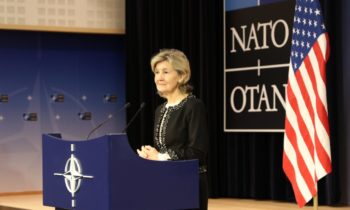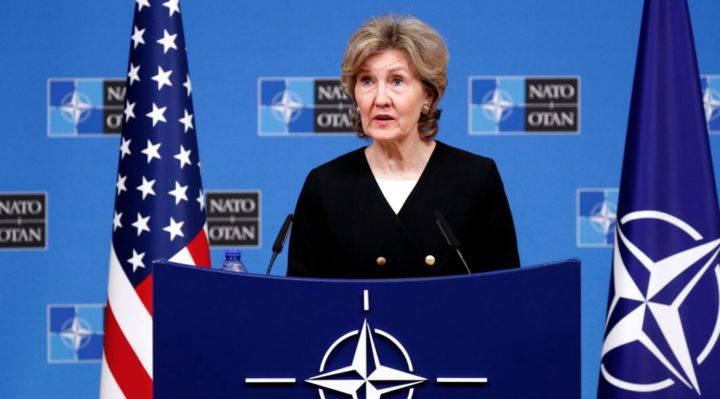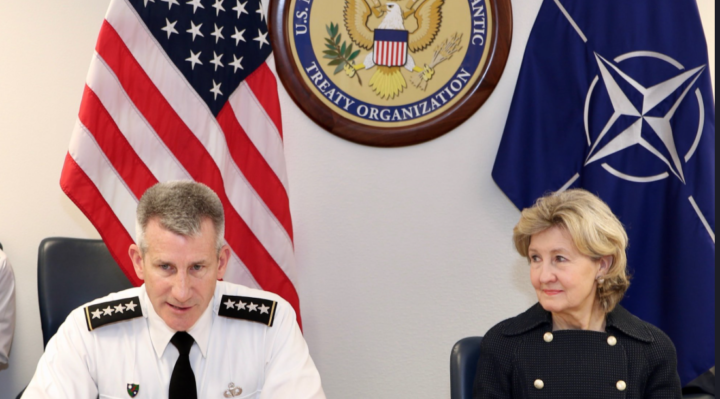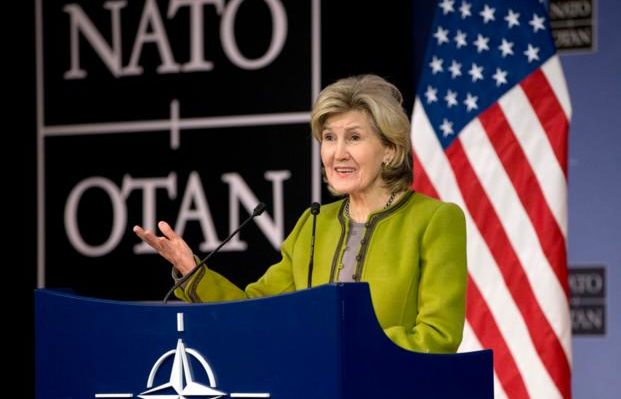 The U.S. ambassador to NATO has said that if necessary, the United States would consider to ‘Take Out’ Russian missile system that Washington contends Moscow is developing in violation of a nuclear arms treaty.
The U.S. ambassador to NATO has said that if necessary, the United States would consider to ‘Take Out’ Russian missile system that Washington contends Moscow is developing in violation of a nuclear arms treaty.
Speaking to reporters in Brussels on October 2, Ambassador Kay Bailey Hutchison called on Russia to halt development of the 9M729, which the United States says is a violation of the 1987 Intermediate-Range Nuclear Forces (INF) Treaty.
“It is time now for Russia to come to the table and stop the violations,” Hutchison said on the eve of a meeting between Defense Secretary Jim Mattis and his NATO counterparts.
If the system “became capable of delivering,” she said, the United States “would then be looking at the capability to take out a missile that could hit any of our countries in Europe and hit America.” also she said that NATO looks forward to welcoming Macedonia as a member of the alliance, US Envoy to NATO Kay Bailey Hutchison said in a press briefing on Tuesday. “We are very pleased that they got over a 90 percent vote in the referendum that they had, and we now look to the people of Macedonia and the Parliament to take the next step and we hope to welcome Macedonia, Northern Macedonia, as a new member of our alliance in the near future,” Hutchison said.
Earlier on Tuesday, NATO Secretary General Jens Stoltenberg said the accession talks have already started, and negotiations to make Macedonia part of NATO could be completed by January 2019.

U.S. Ambassador to NATO Kay Bailey Hutchison briefs the media ahead of a NATO defence ministers meeting at the Alliance headquarters in Brussels, Belgium, October 2, 2018. REUTERS/Francois Lenoir
Below is a full rush transcript of the press conference by Ambassador Kay Bailey Hutchison, U.S. Permanent Representative to NATO.
Ambassador Kay Hailey Hutchison: Thank you so much, First of all, we will be going through the summit outcomes. We had an excellent declaration from the summit where all 29 allies came together to focus our efforts on a deterrent Russia and a counterterrorism force that is so important for all of our countries to stop terrorism from entering any of our alliance countries. So we are very pleased with the summit declaration, and we are now into implementation phase.
First, we will be talking about our capabilities that we have all now agreed will be our goal and that is the Four 30s, 30 battalions, 30 air squadrons, 30 ships available for deployment in 30 days or less for any crisis that our allies might face. This is what we considered to be a goal that will address all of our risks and threats which is our common defense requirement.
Secondly, we have a NATO command structure that was reformed. We have two new headquarters, one in the United States, one in Germany that will be working or addressing the threats both in maritime and enabling our joint support and enabling command for logistics through Germany. We have a commitment on military mobility, counter hybrid support teams and cyber operations at SHAPE, that are very important for the progress in implementing our capabilities.
We have established of course a defense investment of 2% of gross domestic product. We are on course to showing a great improvement in alliance defense capabilities. Right now we set eight allies to reach 2% this year, approximately two thirds of the alliance is on track to do so by 2024. And we are working on plans that would be submitted by January 1 that show the effort of all of our allies to increase spending and move towards the 2% which was the recommitment made in July. We also have our Nuclear Planning Group at this Defense Ministerial. The alliance’s nuclear deterrent is essential to our overall deterrent and defense posture. The ministers will discuss these issues, as it is very important which we do from time to time in our ministerials, and it is an important nuclear deterrent, and one that must remain safe, secure and effective. We will have a NATO-Georgia Council, very important that we continue to work with Georgia and the NATO-Georgia Council meeting. We support Georgia’s sovereignty and territorial integrity and reaffirm our commitment to work closely with Georgia.
I think fighting terrorism and the open door were the other parts of the summit that would be implemented. In fighting terrorism, of course, we are strongly in support of the training and working with our Afghan – the Afghan government to train their forces to solidify the fight against terrorism in Afghanistan. This is a mission that 41 allies and partners have come forward again and committed to at least 2024 in the funding of this, but everyone has also in place the new strategy that was announced last August and has been affirmed by our 41 allies that are helping in this regular support mission.
The new mission in Iraq was also a summit declaration deliverable, that mission would be led by Canada. It’s a very important mission to train and advise the Iraqi troops and their police force to try to keep Iraq stable after ISIS is defeated. I think that is also a very important part of our fight against terrorism, that we would try to help stabilize the countries with their own troops taking the lead. So I think we have a good summit declaration to work with, and this first defense ministerial following that will begin the implementation phase.

Question: Ambassador, I have a question regarding Turkish U.S. relations. I would want to know whether Mattis might meet his Turkish counterpart Akar and how does this tension between the U.S. and Turkey affect cooperation in NATO? The follow-up question regarding how the U.S. views Turkey because as ties between the U.S. and Turkey have turned sour. Relations between, for example, Greece has increased military cooperation especially and also in the Middle East, the U.S. does not really cooperate with Turkey anymore. Could you elaborate on how the U.S. views strategic and military cooperation with Turkey?
Ambassador Kay Hailey Hutchison: Yes. Turkey is a very important NATO ally, that has not changed. Our General Dunford, Chairman of our Joint Chiefs has met with the Turkish chairman of their Joint Chiefs. They have firm relationship, as the SACEUR with the Turkish defense officials, and most certainly our Secretary of Defense with the Turkish Minister of Defense, who was formerly the chairman of their defense is very strong. Yes, there are bilateral differences that are very well known, but that has not kept us from having the bilateral military conversations and most certainly in NATO, Turkey remains a strong ally. In Afghanistan, they are a framework nation, and they have supported all of our missions since they became a member of NATO. We will continue to work through differences most certainly and look forward to continuing that dialogue.
Question: Thank you, ambassador. how do you evaluate Hungary’s policy towards Ukraine’s NATO plans as Hungary is blocking now this process for months because of this Ukrainian law on education?
Ambassador Kay Hailey Hutchison: We are continuing to encourage Hungary to not use the bilateral disagreement to stop the NATO commitment to working with Ukraine. It is important for Ukraine, which has the Russian aggression on its borders that we help them in every possible way to deter the Russian aggression, so they have sovereignty and the capability to stabilize their country into a working democracy. We hope that Hungary will work out its differences on the education law separately with Ukraine and then join us in NATO to help Ukraine in every way to keep their sovereign territory and stabilize their democracy.
Question: Are the European countries’ expenditures satisfactory at this point or do you still have a way to go?
Ambassador Kay Bailey Hutchison: The defense investment of our country which all acknowledge, are made for their own purposes, for the security of their own people are going in the right direction. Every country has stopped the decline in defense spending and has started going in the right direction to increase defense spending. Italy is one of those countries that is increasing, but we are not nearly where we need to be for the overall alignment of the goals of the Four 30s. Italy is a framework nation in Afghanistan, doing an incredibly good job, and they have been a valuable member of the alliance. They are increasing defense spending, and we are encouraging them to increase more because they do have the capability to be a major contributor. They are in NATO, so it is important for all countries to meet the 2% requirement for the overall defense that is common for all of us.
If everyone will meet the capability targets that everybody has agreed to in our summit as well as in NATO alliance, that will go toward the overall common defense that we must have. If some countries were not there yet, then we don’t have the total capability that we need. We are very convinced that people are going in the right direction or asking them to move as fast as they can, and we are asking them to show the plans that they have to meet those common goals. And by ‘we’, I mean NATO is asking for this, and our declaration in July by the heads of state.
Question: Madam Ambassador, Sevastopol also with Black Sea dominated by Russian navy. If any chance to balance this security situation?
Ambassador Kay Bailey Hutchison: Yes. We do have a bilateral European deterrence initiative where we are reinforcing the countries that as you say are right there in the proximity of Crimea that would improve Romania, Bulgaria, Poland as well as the Eastern flank, that is an addition to our enhanced forward presence that is a NATO function that works in Poland as well as the Baltic. So the United States is through its European initiatives enhancing the capabilities for Romania and Bulgaria especially, because we do know their proximity to Crimea, and we want to assure that they have the defense and deterrence capabilities that they require and we are working with them.
Question: Once the international coalition is done eradicating ISIS there, does NATO actually need a specific mandate from the Iraqi government to intervene in terms of training and advising the Iraqi troops? You mentioned there was a mission planned that was going to be led by Canada, so does the Iraqi government approve this officially? Also, second question, who will be part of this mission? What NATO nations will be the part of it?
Ambassador Kay Bailey Hutchison: First of all, of course, we will not go into Iraq without the government’s approval, and we are getting all of the signals that the government very much wants the stabilization of Iraq. We learned a lesson hard way that our allied forces left before there was a stabilizing influence in Iraq, and ISIS was the result. We want to eradicate ISIS and then have a follow-on stability effort that would train and advise the Iraqi police and armed forces with the consent, of course, and the government approving and wanting to have that stabilization for it which we believe, they are giving us the signals that they do.
The countries that are going to participate are not yet finalized but there has been a very broad coalition in the coalition to defeat ISIS, many of those countries will be in the follow-on force. It will be a voluntary effort from that countries will make that decision, and it is something that most certainly many are saying that they will agree to do. I do want to say that, I think, we certainly appreciate the Canadiansn stepping forward to agree to command this new stabilization advisory and training mission.
Question: Ambassador, my question is on the 2% target which is one of the sticking points. So there are critiques from the academic world, let’s say, where the measure captures only the extent of the expense and not the effectiveness of this expense. So are there efforts on the NATO side to move maybe towards a different kind of measurement that could account for effectiveness instead of only the expense?
Ambassador Kay Bailey Hutchison: That’s a very hard question, how you measure effectiveness because, of course, you have to be able to show results, and NATO has shown results and the capabilities to adapt to risk and to go into the areas where we are seeing a need. One thing we do, and it is hard to quantify but it does show the strength of the alliance and that is to look at the countries that are contributing to the missions that we have. Most certainly the cash contributions are to create capabilities. We have to have the equipment, we have to have the airplanes, the ships, the tanks to do any kind of an effort that we will have in either a threat or a future need. That is what the cash does.
The contributions are so important to the strength of the alliance and that are the contributions of troops and the missions that we have in Afghanistan, we will be going into Iraq, we have to pay for the peacekeeping missions in Kosovo, and we have enhanced forward presence where these reinforcements in Europe are now training together, they are interoperable. This is very important for our future effectiveness that we now have these NATO countries and NATO countries that are contributing to the three Baltic countries plus Poland, and then we have further American troops in Bulgaria and Romania adding to that.
All of these are now troops that are interoperable, training together, learning how to work together, so that when there is a crisis, it becomes easy to go into a place where there is a crisis and work together and know how to operate in our alliance. So, to measure that may be hard, but it is a fact that it is causing the effectiveness of our NATO alliance that we are having these real-time opportunities in our missions that we are putting together right now and implementing.
Question: What is your reaction on the former Yugoslavian Republic of Macedonia referendum last Sunday? How does that affect, especially the low turnout, the negotiations for the country to be accepted as member of NATO?
Ambassador Kay Bailey Hutchison: We are committed to bringing in the new Macedonian country, the Northern Macedonian country. We are pleased that in the election or the referendum rather, that there was such a high positive in the 90s that is amazing in democracy. We think that is a great sign. We now leave it up to the parliament in Skopje to go forward, and NATO is ready to accept a newly named Northern Macedonia, that would be the 30th member of NATO, that is absolute, that commitment has been made. We appreciate the role of Greece in working with this issue for a long time and coming to a conclusion, and we hope that that cooperation with the government in Skopje will continue because if the people of Macedonia want this membership in NATO, NATO is committed to helping them achieve that membership.
Question : can you give us a more general assessment of transatlantic relations given the still unresolved current issues between the United States and Europe, such as differences on Iran?
Ambassador Kay Bailey Hutchison: I think the transatlantic bond in security is secure. I think the transatlantic bond in general is secure. We are in a disagreement most certainly on the agreement, the JCPOA with Iran but we are not in disagreement with our allies on the malign activity that Iran is exhibiting, what they are doing helping terrorists in Syria, in Yemen and other places in that area are debilitating, and it needs to be stopped, and our alliances have made strong statements to that effect. We are in alliance on that, and we hope that Iran will come back to the table and discuss the malign activities that they are perpetrating and destabilizing in the Middle-East.
Question: How do you evaluate Bulgaria’s engagement with the alliance? And one a bit longer, there are some recent report from the Pew Research Center that the global image of the U.S. has effectively plummeted since the election of President Trump. What are the chances that Russia will become more aggressive towards the vulnerable NATO members, and what would America do to prevent that?
Ambassador Kay Bailey Hutchison: Yes. America, I think, is most certainly showing its commitments to Bulgaria and Romania with our European deterrence initiative which is an American initiative adding to the enhanced forward presence that focuses on Poland and Lithuania, Latvia and Estonia, Baltic countries. We do realize that Bulgaria and Romania are also very close in proximity to Russia, and we are committed to working with them, they are members of our alliance and important members that contribute to our alliance, and we are committed to all of those countries that are in that proximity and concerned about their security. We are working with them in every possible way to strengthen their defenses and deter Russia from intervening in our allied country members.
Ambassador Kay Bailey Hutchison: Thank you very much for your interest. I think those were very good questions from a variety of our strong allies, and we are, I’ll just say one more time that the United States is a leader in NATO, we intend to remain a leader in NATO. We are committed to the transatlantic bonds that has been our strength for over almost 70 years, and we will continue this alliance which has succeeded in contributing to the peace throughout the alliance territory, and we are adapting to the changes that are necessary to secure our future. Thank you so much.

Ambassador Kay Bailey Hutchison
Ambassador Kay Bailey Hutchison was sworn in as the Permanent Representative of the United States to the North Atlantic Treaty Organization on August 15, 2017. From 1993-2013, she served as a U.S. Senator from Texas and was also elected to a Senate leadership position. Ambassador Hutchison gained extensive international experience and developed a deep understanding of NATO as a Member of the Senate Armed Services Committee. She also served as Chairman of the Military Construction Subcommittee and as a Member of the Defense Subcommittee on the Senate Appropriations Committee. She served two terms as Chairman of the Board of Visitors of the U.S. Military Academy at West Point.
Prior to assuming her duties, Ambassador Hutchison was a prominent attorney at Bracewell, LLP, an established international law firm in Dallas, Texas. Ambassador Hutchison also served in the Texas House of Representatives, as the Texas State Treasurer, and as Vice Chairman of the U.S. National Transportation Safety Board.
